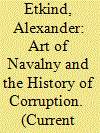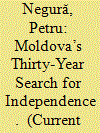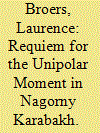| Srl | Item |
| 1 |
ID:
181524


|
|
|
|
|
| Summary/Abstract |
Alexei Navalny has been the most prominent campaigner against Russia’s massive oil-fueled corruption, reaching millions of viewers with witty video exposés. Now imprisoned in a penal colony after returning to Moscow following his recovery from a poisoning, he has made his own bodily suffering a potent symbol of protest, tapping into a deep Russian tradition of dissent.
|
|
|
|
|
|
|
|
|
|
|
|
|
|
|
|
| 2 |
ID:
181523


|
|
|
|
|
| Summary/Abstract |
Churches and other faith-based communities have taken the lead in the human rights sector in Russia. At a time when many secular activists have been harassed, imprisoned, forced into exile, and even murdered, interfaith partnerships working on civil rights for minorities and migrants have been tolerated and officially recognized. Part of a long history of civic–oriented religious activism, they benefit from their legacy as moral leaders. While some religious activists have publicly challenged the Russian state’s authority and values, most have been careful to present themselves as partners of the state, even if their beliefs are not always fully aligned.
|
|
|
|
|
|
|
|
|
|
|
|
|
|
|
|
| 3 |
ID:
181522


|
|
|
|
|
| Summary/Abstract |
Unlike in the Baltics, support for independence in Moldova was relatively low among the political elites and the general population when the Soviet Union collapsed. In the 1990s, the political parties in power pursued an incoherent program, as governments swung between reformist and conservative agendas. Economic crises and systemic corruption depleted citizens’ trust in politicians and state institutions. This low institutional trust has hampered governance at all levels, and primarily in crises such as the COVID-19 pandemic.
|
|
|
|
|
|
|
|
|
|
|
|
|
|
|
|
| 4 |
ID:
181520


|
|
|
|
|
| Summary/Abstract |
The Minsk Group, led by the United States, France, and Russia, has brokered the Armenian-Azerbaijani conflict since the mid-1990s after Armenia-backed secessionists in the unrecognized Nagorno-Karabakh Republic won the first Karabakh war of 1992–94. That mediation embodied the ideals of the mid-1990s unipolar moment, which assumed that liberalized markets and democratic transitions would converge internally to resolve legacy conflicts in postsocialist states while bringing them into convergence externally with Euro-Atlantic nations. Those assumptions withered away over the next quarter-century. Neither Azerbaijan nor Armenia transitioned to liberal democracy. Backed by an increasingly assertive Turkey, Azerbaijan prevailed in a bloody war in 2020. This time, the regional authoritarian powers, Russia and Turkey, are overseeing what could be a test case for a new form of “illiberal peace.”
|
|
|
|
|
|
|
|
|
|
|
|
|
|
|
|
| 5 |
ID:
181521


|
|
|
|
|
| Summary/Abstract |
How have Central Asians built livelihoods amidst economic hardship and political dysfunction during three decades of post-Soviet independence? Local leaders are mobilizing people, resources—and, importantly, trust—to enable entire communities to prosper. These nonstate figures are increasingly consequential, but their model of paternalistic patronage may not represent what all Central Asians want.
|
|
|
|
|
|
|
|
|
|
|
|
|
|
|
|